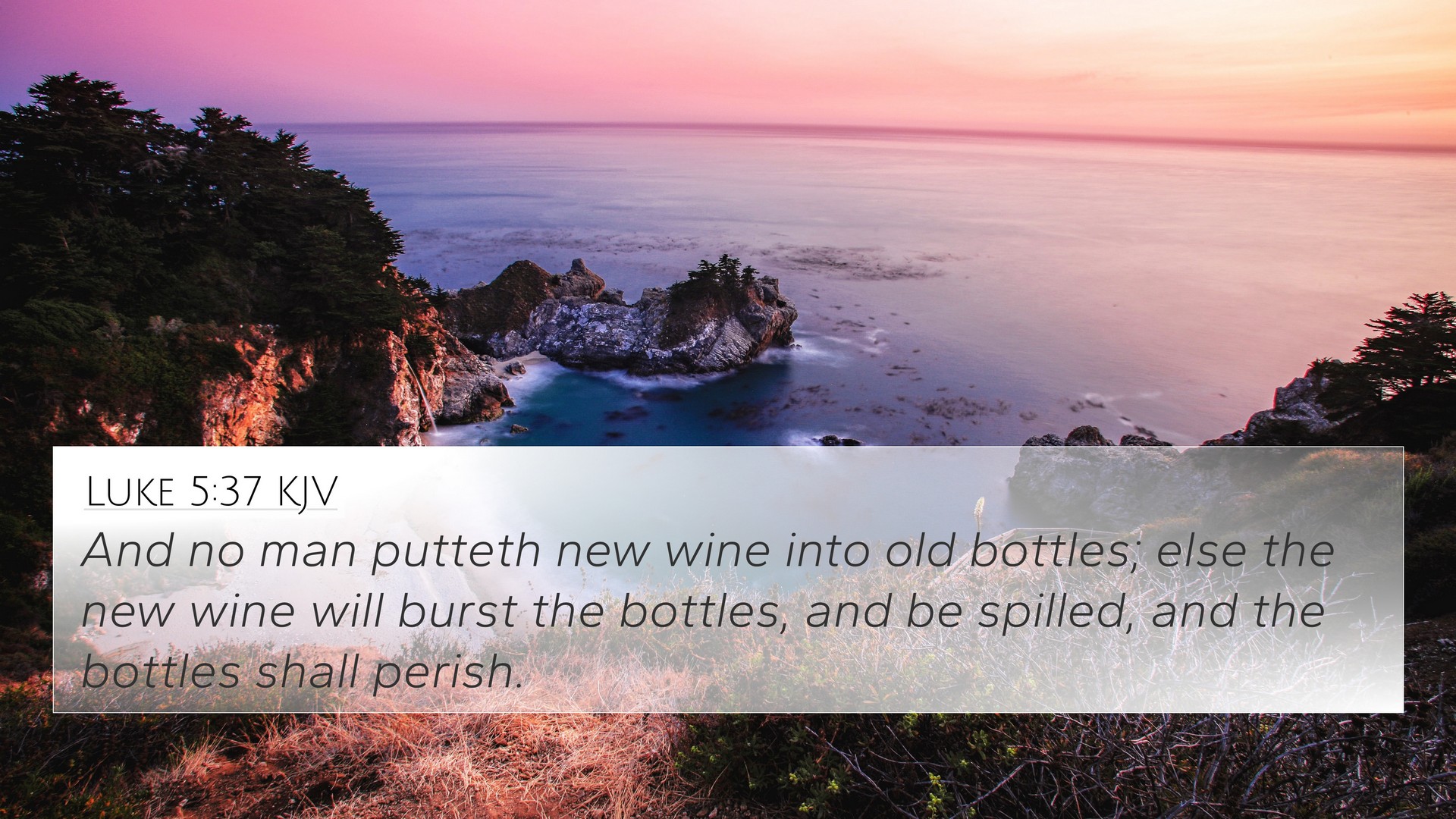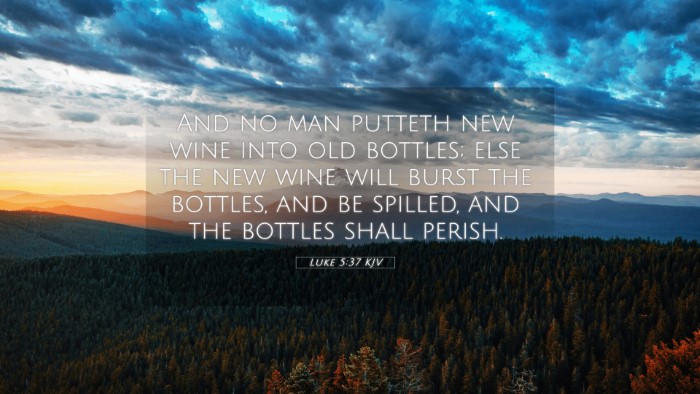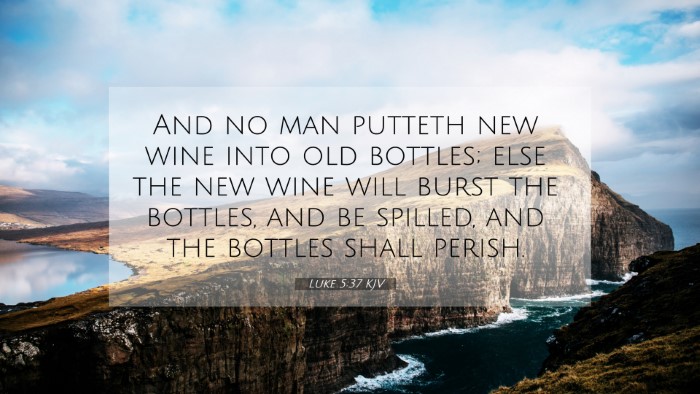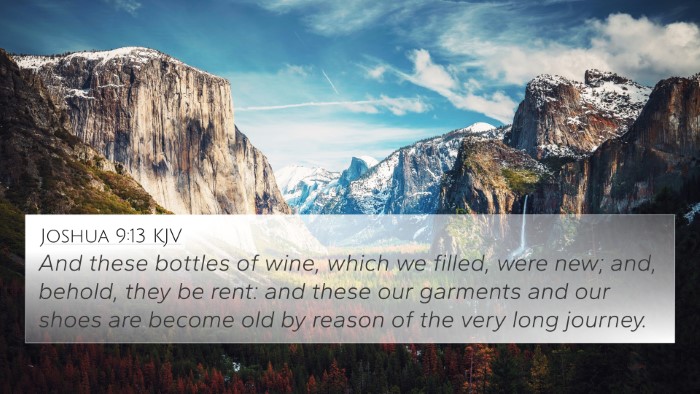Understanding Luke 5:37
Verse: "And no one puts new wine into old wineskins. Otherwise, the new wine will burst the skins; it will be spilled, and the skins will be destroyed." (Luke 5:37)
This verse from Luke offers profound insights into the nature of divine revelation and the transformative work of Christ in the lives of believers. In examining this scripture, we find significant connections between various biblical texts and themes.
Key Themes in Luke 5:37
- Newness of Christ's Teachings: This verse emphasizes the radical nature of Jesus’ ministry, illustrating that the old ways cannot contain the new covenant He establishes.
- Transformation and Renewal: The metaphor of new wine being inappropriate for old wineskins symbolizes the need for renewal in the follower’s life and the church.
- Covenant Relationships: The verse addresses how the old covenant (represented by the old wineskins) cannot hold or contain the new covenant brought by Jesus.
Cross-References to Luke 5:37
- Matthew 9:17: Similar teaching about new wine needing new wineskins, emphasizing the newness of Jesus' teachings.
- Mark 2:22: Discussion of new wine and old wineskins, reinforcing the theme of transformation in Christ.
- Isaiah 43:19: God's promise of a new thing, indicating a shift from the past to a new era.
- 2 Corinthians 5:17: "Therefore, if anyone is in Christ, the new creation has come: The old has gone, the new is here!" that echoes the theme of renewal.
- Hebrews 8:13: Discusses the new covenant, foreshadowing the obsolescence of the old.
- Matthew 21:33-41: Parable of the tenants, demonstrating the rejection of the old ways.
- Luke 18:17: The need for childlike faith in entering God’s kingdom, indicating the requirement for change and new understanding.
- Galatians 6:15: "Neither circumcision counts for anything, nor uncircumcision, but a new creation." This reflects the necessity of radical transformation in Christ.
- John 3:3: Jesus tells Nicodemus about being born again, further illustrating the need for spiritual rebirth to accept new truths.
- Romans 12:2: Encouragement to not conform to the pattern of this world, but to be transformed by the renewing of the mind.
Interpretation and Application
To grasp the fullness of Luke 5:37, one must consider the broader context of Jesus’ ministry. The old wineskins represent the established traditions and religious customs that, while important, limit the understanding of God’s growing revelation through Christ. Matthew Henry’s commentary stresses that this new teaching challenges existing structures and requires a fresh approach to faith.
Albert Barnes highlights that putting new wine in old wineskins can lead to destruction—akin to adhering to old ways while attempting to embrace new truths, leading to conflict and inconsistency in one’s spiritual life.
Adam Clarke underscores the necessity of being open to spiritual renewal, suggesting that just as old wineskins cannot adapt to new wine, our hearts and minds need to be transformed to receive the fullness of Christ’s message.
Cross-Referencing and Thematic Connections
The essence of Luke 5:37 serves as a pivotal point for thematic Bible verse connections and a springboard for deeper scriptural study. Utilizing tools for Bible cross-referencing can help uncover insights about transformation, covenant relationships, and the tension between old and new.
Engaging in a comparative Bible verse analysis with the noted cross-references leads to a richer understanding of the biblical narrative across both the Old and New Testaments. For example, the links between Old Testament prophecies and their fulfillment in the New Testament are constantly interwoven, illustrating God’s overarching plan for redemption.
Tool for Study
The use of a Bible concordance enables readers to systematically find connections between various verses. This methodology not only enriches personal study but also aids in sermon preparation and teaching contexts.
When preparing a cross-reference Bible study, one might consider the following approaches:
- Identify key terms: Look for specific words or phrases in Luke 5:37 and trace their occurrences in other scriptures.
- Use thematic categories: Arrange verses by common themes such as transformation, covenant, and renewal.
- Explore contextual relationships: Investigate how other passages illuminate or contrast with Luke 5:37.
Conclusion
Luke 5:37 vividly illustrates the need for renewal and reformation in both individual believers and the collective body of Christ. By cross-referencing this verse with related scriptures, one can gain a deeper understanding of its implications within the broader landscape of biblical theology. As we navigate through scripture, we should be encouraged to recognize the dynamic connections between biblical texts that reveal God’s timeless truth and transformative power.





